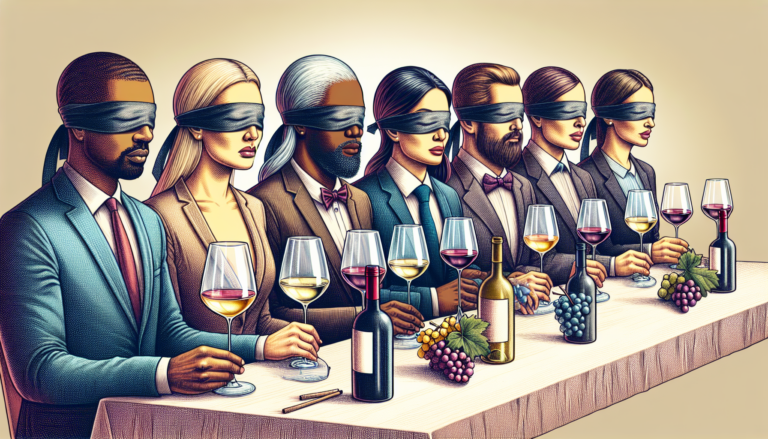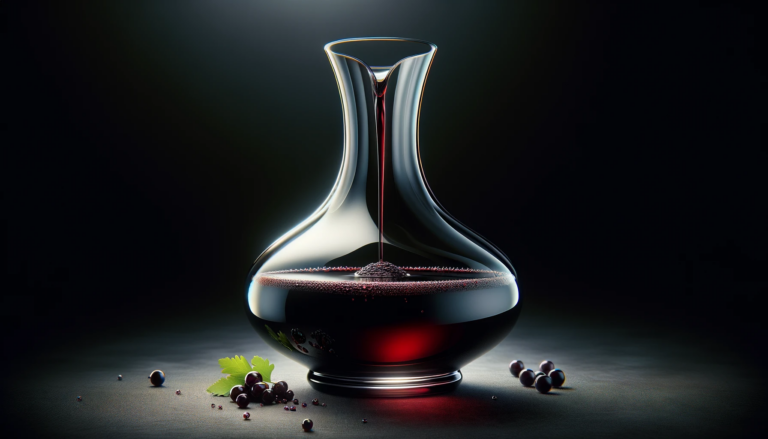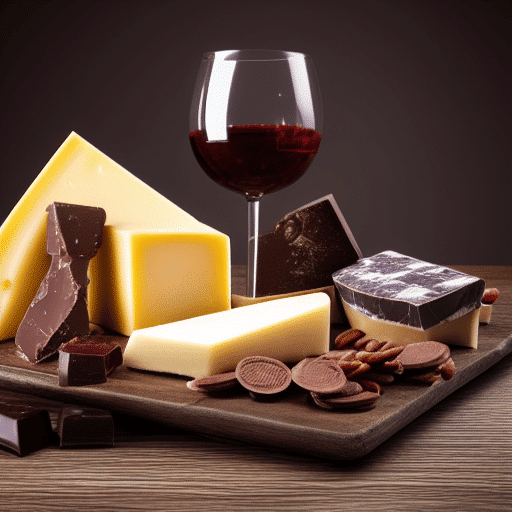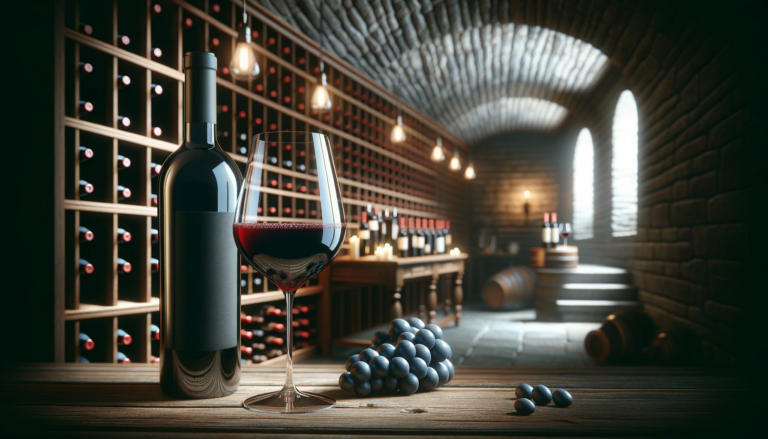The Influence of Music on Wine Tasting Perception
How does music influence your perception of wine? This article uncovers the subtle yet profound impact melodies can have on wine tasting notes, diving into the surprising ways auditory stimuli can interact with our sense of taste. Without divulging all its secrets upfront, the piece promises a journey through sensory science, lively experiments, and pragmatic advice for your next tasting session. Discover how the allure of music goes far beyond the ears—it could be the secret ingredient to making your next glass of wine taste even better, as we explore how the influence music has on wine tasting.
Table of Contents

Key Takeaways
Music can significantly influence how we taste wine, even altering perceptions of sweetness and acidity, regardless of our tasting experience even on just novice drinkers.
Various studies suggest that music affects tasting by enhancing specific sensory attributes and overall enjoyment, with effects evident among both novices and experts.
Cultural and personal preferences play a crucial role in wine-music pairings, and technology is increasingly being used to personalize wine experiences and recommend pairings.
The Science Behind Music and Wine Tasting

The connection between music and wine goes beyond merely setting a romantic mood or providing background noise at tasting events. Recent studies demonstrate that music can significantly influence the eating/drinking experience, altering how we perceive the taste of wine. The power of music to influence wine taste perception is not limited to the untrained palate; even the most experienced wine tasters are subject to its effects.
Interestingly, the influence of music on sensory and hedonic wine evaluation seems to be consistent, irrespective of the taster’s own wine evaluation experience. This suggests that the influence of music on wine tasting may have a consistent impact on hedonic wine evaluation perception regardless of individual experience levels in wine tasting phase. This implies that the music playing in the background while tasting wine can shape your perception of its sweetness, acidity, and overall flavor, whether you’re a novice or a seasoned professional.
But how does this occur? What makes the sweet and sour tastes of wine amplify by the sounds of music and how does it heighten acidity? The answer lies in the fascinating fields of sensation transference and crossmodal matching, and the unique way our brains process sensory information.
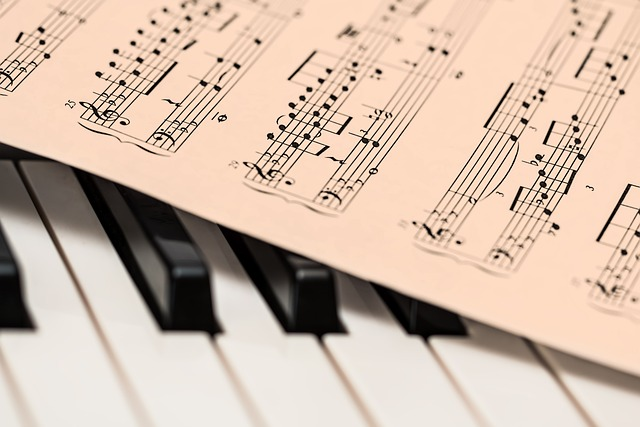
Sensation Transference and Crossmodal Matching
While savoring a glass of wine, your sense of taste alone doesn’t shape your perception of its flavor. The term “olfactory” refers to the sense of smell, a critical component of how we perceive flavors. In wine tasting, olfactory expertise is essential, as the aroma of the wine can greatly influence its taste and overall sensory experience. The olfactory system, which includes the nose and the brain’s olfactory centers, detects and processes the myriad aromatic compounds present in wine, contributing to the complexity and enjoyment of the wine-tasting experience.
Research has shown that using both the nose and mouth during tasting can heighten satisfaction with the flavor and emotional experience. On the other hand, when the sense of smell is restricted, such as with a nose clip, there is a noticeable decline in the appreciation of the wine’s flavor. This highlights the pivotal role of olfactory expertise in the tasting experience, underscoring the significance of detecting a wine’s aromatic threshold in shaping the overall sensory evaluation. Now, consider the sensory amplification when you introduce another layer into the mix – the sense of hearing. That’s where the magic of music comes in, adding depth to the experience by affecting our perception of the wine’s sensory properties.

Emotional Mediation and Neural Cross-Wiring
Music plays a significant role in evoking emotions, and these emotions can profoundly influence our perception of taste and flavor in wine. Both wine and music can generate emotional arousal, which may contribute to a synergistic experience. This connection between music and taste perception is not just psychological; it also has a biological basis. Neural connections between areas responsible for hearing and taste may explain why music affects wine-tasting perceptions. This cross-wiring in the brain allows for the interaction of the senses, leading to enhanced tasting experiences when paired with music.
Our biological predispositions to associate certain tastes with specific sounds or music can inform the crossmodal effects of tasting. The result? A symphony of flavors, guided by the influence of music we hear as we taste. It’s as if each sip of wine is a note in an unfolding composition, with the background music’s tempo, pitch, and timbre providing a backdrop that can elevate a humble grape to a crescendo of gustatory delight. Imagine a bold, robust red wine is paired with the deep, sonorous tones of a cello suite, each sip reverberating with the strings’ resonance, enhancing the wine’s complex character. Conversely, a light, effervescent sparkling wine might find its perfect match in a sprightly piano sonata, the high notes accentuating the wine’s crispness and sparkle. This multisensory interplay model wine isn’t just fanciful thinking; it’s grounded in science, yet it can transform the act of tasting into an immersive, almost theatrical experience.
Wine Tasting Experiments: Music’s Effects on Wine Perception

The effects of music on wine perception are not merely theoretical. Numerous studies and experiments have been conducted to understand how music changes our sensory and enjoyment assessments of wine. For instance, in previous studies involving wine experts in the wine industry, despite their in-depth analytical training, even highly trained wine specialists are not immune to the effects of music on their perception of wine.
Many previous studies consistently show that music can enrich the senses and enjoyment of wine, regardless of the taster’s experience level. This underscores music’s universal power and influence in shaping our wine-tasting experiences, whether you’re a seasoned connoisseur or a casual sipper.
In a notable experiment led by Spence et al., an experimental psychologist, and his colleagues, seasoned wine writers and tasters were asked to assess various characteristics such as the body, balance, length, and overall enjoyment of both wines with music. Spence et al. focused the study on two Chardonnays from Ontario, Canada – the Tawse Quarry Road Organic Chardonnay 2012 and the Speck Family Reserve Chardonnay 2013. This evaluation method is not uncommon in food science and is often mirrored by other writers and journalists when critiquing wines to record their findings.
It was discovered that very experienced wine tasters, experts, use distinct brain regions for sensory integration and cognitive processing when tasting wine with music, a contrast to novice, untrained wine tasters. This suggests that the interplay between music and wine is rich and complex, offering an exciting area for future research.

Clark Smith’s Harmonies and Discordances
Among the explorers of this fascinating relationship between wine and music is Clark Smith, who is an established wine writer and winemaker from Florida, USA. Smith orchestrated experiments with 150 wines while playing around 250 songs to discover the harmonies and discordances between them. Smith’s experiments suggest that the flavors of wines change when paired with specific music, and certain wines were rated as ‘more delicious’ with particular songs. These findings highlight the potential for creating unique and pleasurable experiences by experimenting with different wine and music combinations.
Smith’s findings include recommendations for music-wine combinations that work well together. For instance, wines with a darker and denser character tend to harmonize well with music with lower sound frequencies. However, remember that these music matches and combinations aren’t rigid. Aggressive musical pieces, for example, may not pair well with lighter wines like Pinot Noir but may complement a robust Cabernet Sauvignon.

Adrian North’s Empirical Work
Another notable researcher in this field is Prof. Adrian North, who studied music’s impact on wine-tasting experiences among university students. During the experiment, half the participants were tasked with evaluating two wines while listening to different soundtracks. North’s study focused on assessing the influence of music on wine-tasting perception and how music influenced participants’ perceptions of more complex wine characteristics such as body, balance, and length. The findings of Adrian North’s experiment highlight music’s role in shaping consumer experience, especially regarding complex sensory characteristics.
Therefore, the next time you enjoy a glass of wine, take note of the background music. It might be shaping your perception of that wine more than you think!
The Role of Music in Enhancing the Wine

As we’ve seen, music can influence specific sensory attributes of wine, such as:
perceived sweetness
acidity
fruitiness
astringency
length
This effect is consistent across different wine types. For example, wines sampled with music that complements specific flavor profiles, like oak-derived flavors, are perceived as fruitier and smoother versus when sampled in silence.
The concept of food science of ‘sonic seasoning’ explains how music can shift tasters’ focus to a wine’s strengths and minimize its flaws, improving the tasting experience of every day and well-balanced wines. This means the right music can make your wine taste better by highlighting its best attributes and downplaying its weaknesses.
Furthermore, a harmonious pairing of music and fine wine can lead to a comprehensive sensory experience, enhancing the overall ambiance and aesthetic pleasure of the wine tasting. This is why the right soundtrack can make your fine wine-tasting event a hit, creating an immersive experience that will have your guests talking for weeks.
Sweet and Sour Music
Now, let’s explore in more depth the influence of specific genres of music on wine perception. Studies have tested the impact of music characterized as ‘sweet’ or ‘sour’ on taste evaluation, focusing on more nuanced attributes, such as length and balance, and assessing the influence of wine body itself.
The right type of music can selectively enhance or mute certain taste elements like sweetness and sourness in wine. For instance, wines with a naturally sweeter taste profile were perceived as tasting sweeter when paired with a soundtrack that had a ‘sweet’ musical quality.
Conversely, wines with higher acidity were more enjoyable when accompanied by music that may not be as universally liked but carries a ‘sour’ auditory quality. This indicates a harmonious relationship between the music and the wine’s flavor profile, presented with fresh acidity, where the music accentuates the wine’s natural characteristics.

Staccato Music and Wine Characteristics
Staccato music, known for its short and sharp sounds, is another interesting study area. Research has shown that staccato music can potentially enhance the perception of body and length in wine. For example, a sparse staccato soundtrack can enhance the perception of a wine’s fullness and length. Despite being less favored, staccato soundtracks correspond with a more favorable taste evaluation of the wine’s body, balance, and finish.
In essence, staccato soundtracks correlate with the perception that many wines have a fuller body, superior balance, and a longer finish. Therefore, wine experts say, for your next glass of full-bodied red, why not accompany it with some staccato music and see if it enriches your wine-tasting experience?

Cultural and Individual Differences in Wine-Music Pairings
While the scientific aspect of music and the participants ‘ tasting experience is compelling, it’s crucial to acknowledge the highly personal nature of these experiences. Cultural background significantly impacts preferences in wine-music pairings, with certain music genres being more appreciated in specific regions. Wine consumers in different countries show varied responses to the same music when tasting the same wines together, indicating the cultural influence of music on wine perception even among them. This diversity in traditional music across cultures suggests that there will be no one-size-fits-all approach to wine and music pairing.
Individual variability also plays a significant role in response to wine-music pairings. A listener’s connection to the music can affect the enjoyment and perception of wine, potentially overruling common pairing suggestions. Even experienced wine professionals and tasters might perceive the impact of music on wine differently than casual consumers, suggesting expertise plays a role. Essentially, even though research can provide general guidelines on music’s influence on wine perception, we must also consider our personal tastes and cultural backgrounds. After all, the best wine-music pairing is one that you enjoy!
The Future of Music and Wine Pairing
As our understanding of the connection between music and wine deepens along with our wine appreciation, we are also witnessing the role of technology in shaping this relationship and demystifying traditional wine-tasting expertise. Emerging technologies are democratizing sommelier-level wine expertise by making it more accessible to novice and experienced wine enthusiasts, thus influencing wine perception among all wine professionals. In this context, traditional wine-tasting expertise remains a valuable skill set for wine professionals to master and share with others, ensuring the continued growth and development of wine professionals in the industry.
The inclusion of technology in the wine industry aids wine business in:
Connecting users globally and introducing them to a diverse array of wines and wine regions
Improving the wine selection process
Introducing gamification into wine education, thereby enhancing user engagement.
Personalization in wine experiences is evolving with apps that learn user preferences, suggest pairings, and encourage the social sharing of selections. The increased consumption of wine during the COVID-19 pandemic has fueled the growth of personalized wine recommendation systems, akin to content suggestions by streaming platforms.
Moreover, curated playlists are being created to harmonize with specific wines tasted during tastings, merging sound with oenology to enhance the sensory wine drinking experience. Projects like Jo Burzynska’s Oenosthesia combine wine and music by composing tracks designed to complement the sensory attributes of various wines.

Practical Applications: Enhancing Wine Tasting Events with Music
So, how can we practically apply our knowledge about music’s influence on wine perception among wine professionals? Music plays a pivotal role in tasting events by providing a backdrop for guests, encouraging social interaction, and enhancing their enjoyment of the wine. Marissa A. Ross, when planning a wine-tasting event, stresses the importance of the strategic selection of not only the wines but also the accompanying snacks and soundtracks. A carefully curated playlist can create an atmosphere that complements the various wines being sampled, making the experience more immersive and enjoyable.
Moreover, wine tastings encourage a diverse music selection, with variations in styles and smooth transitions to keep the experience engaging. Hosting live music performances or designing curated playlists that harmonize with tasting wines can enhance the sensory experience at tasting events.

Live Performances and Playlists
Live performances or curated playlists of “sweet” music can greatly enhance a wine tasting event, too. The right playlist can create an atmosphere that complements the basic tastes of the various wines being sampled, making the experience more immersive and enjoyable. Participants are encouraged to have a diverse music selection, with variations in styles and smooth transitions, to keep the experience engaging. This can range from gentle classical music for a relaxed tasting of white wines to robust rock music for a lively tasting of rich red wines.
Hosting live music performances takes the tasting experience to another level in the wine business. Not only does it provide a backdrop for guests, it also encourages social interaction and enhances their wine-drinking experience, making the enjoyment of the wine even more memorable. Therefore, be it a jazz trio or a string quartet, consider incorporating live classical music performance in your next tasting event.
Jo Burzynska’s Wine-Music Recommendations
Jo Burzynska has got you covered if you’re looking for specific music recommendations for your next wine tasting. She has made specific music track recommendations for pairing with various wine varietals. For example, Burzynska pairs ‘Marlborough Sauvignon Blanc’ with ‘Verde’ from the album ‘La Espada y La Rosa’ by Antonio Pinto for a grassy and citrusy Sauvignon Blanc.
Burzynska’s recommendations cover a variety of genres and wine types. For instance, she recommends classical music for a light and crisp Chardonnay and heavy metal for a full-bodied Shiraz, demonstrating how different music changes the perception of these same wines together. These recommendations serve as a guide for creating a more immersive and enjoyable tasting experience. However, always remember that the most successful wine-music pairing is the one that you and your guests personally relish!
The Last Pour
In conclusion, the connection between music and wine goes beyond mere entertainment. Music plays a significant role in shaping our tasting experience – influencing our perception of sweetness, acidity, and even the body and balance of the wine. While scientific research assessing the influence of music and taste provides valuable insights, cultural context and personal preferences make each wine-music pairing a unique sensory journey. So, next time you pour a glass of wine, consider the soundtrack of your experience. After all, the right music can transform a simple sip into a symphony of flavors!
Frequently Asked Questions
Can choosing the right music make wine taste better?
Yes, choosing the right music can enhance the taste of wine by influencing how we experience its flavors, making it taste mellow with mellow music and livelier with a lively soundtrack. So, next time you’re enjoying a glass of wine, consider pairing it with the right music to enhance wine flavors and your experience.
Does my level of wine-tasting experience affect how music guides my wine perception?
No matter how experienced you are with your wine tasting, research shows that music can influence your perception of wine. So, enjoy your favorite tunes while sipping on that glass of wine!
Have any neuroimaging studies involving wine been conducted before?
Oh, absolutely! Scientists have used cool brain-scanning tech like fMRI and PET to peek into what happens in our noggins when we’re sipping on vino. These studies show the brain lighting up in various ways, giving us the lowdown on how we process the taste and smell of wine. It’s pretty wild to see how much our brains are involved in enjoying a good glass of wine!
Are very experienced wine tasters influenced by music more or less than amateur wine drinkers?
Interestingly, both very experienced wine tasters and amateur wine drinkers are influenced by music, though the nature of the influence might differ due to their levels of expertise. While experienced tasters might analyze the wine more critically, music can still subtly alter their perceptions of taste, just as it does for novices. Thus, regardless of expertise, music has a universal impact on the wine tasting experience.
What kind of music should I play at a tasting event?
You should play a carefully curated playlist with diverse music styles that complement the wine sampled at the event to enhance the overall experience for the guests. It’s important to have smooth transitions between songs to keep the atmosphere engaging and enjoyable.
Can technology help me choose the right music for my wine?
Technology can help you choose the right music for your wine by providing personalized wine recommendations and curated playlists that harmonize with specific wines during tastings. Cheers!


![How to Properly Store Open Wine Bottles | [WSET-3 Reviewed]](https://grapeandbarrel.com/wp-content/uploads/2024/04/55795bf5-78f1-4fd4-a7a9-e4f691c982eb-768x439.png)
